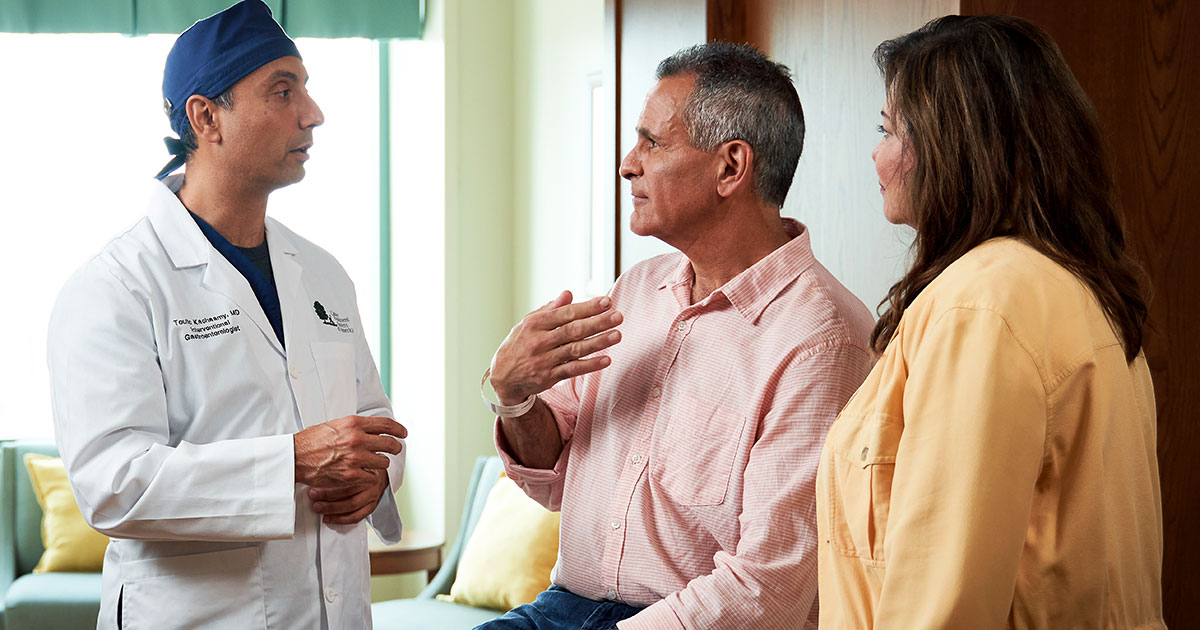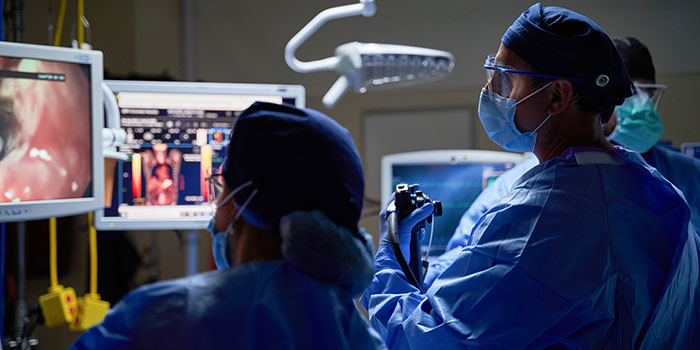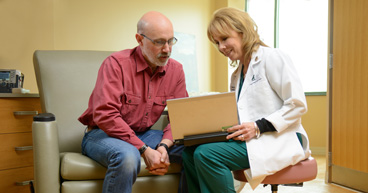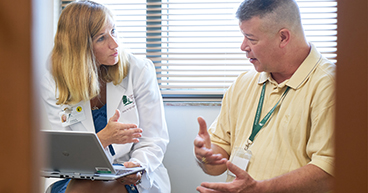
If you recently underwent a colonoscopy, your doctor may have had to remove some colon polyps. Polyps are often harmless, but some may be precancerous or increase your risk of developing colon cancer in the future. That’s why it’s important to understand what colon polyps are, what symptoms they cause, how doctors treat them and when you should be concerned about them.
Polyps inside the colon or large intestine are most often asymptomatic but, may occasionally cause rectal bleeding, fatigue (due to anemia) and chronic constipation or diarrhea that lasts longer than a week. Keeping an eye out for these signs, and reporting them to your doctor, may help catch colorectal cancer early, when it’s easier to treat.
To help you recognize the symptoms of colon polyps and understand the cancer risks they may pose, this article answers some frequently asked questions, including:
- What are colon polyps?
- What causes polyps in the colon?
- Do certain foods cause polyps in the colon?
- Can a doctor tell if whether a colon polyp is cancerous during a colonoscopy?
- How many colon polyps is a lot?
- Does the size of a colon polyp indicate cancer?
- Which types of colon polyps are cancerous?
- How fast do colon polyps grow back?
If you’re interested in learning more about your diagnosis and treatment options, or if you’re looking for a second opinion of your cancer diagnosis and treatment plan, how we diagnosis and treat colorectal cancer at City of Hope®, call us to connect with a member of our team.
What are colon polyps?
Polyps are a small, fleshy growths found on mucous membranes throughout the body. They are common in the colon, intestines, rectum, stomach, nose, sinuses, vocal folds, ear canal, cervix and uterus.
They may be flat like a decal or grow like mushrooms. They range in size from a pinhead to a golf ball. If you have a family history of polyps or certain genetic conditions, you’ are more likely to develop polyps.
Doctors often find colon polyps during a colonoscopy, the gold standard for detecting colorectal cancers and precancerous growths. During the procedure, a doctor inserts a colonoscope—a thin, flexible, lighted tube, lens and scraping tool to remove polyps and/or take biopsies—through the anus into the rectum and colon.
The U.S. Preventive Services Task Force recommends people of average risk 45 and older begin regular screenings for colorectal cancer, including a colonoscopy every 10 years until age 75. If you’ are at high risk for colorectal cancer, you may need to begin screening before age 45. Between Those between the ages of 76 and 85, should discuss screening decisions should be discussed with a doctor. After If you’re older than 85, colorectal cancer screening is often no longer recommended.
Colorectal cancer is the fourth-most common cancer in the United States, accounting for more than 151,000 new cases and more than 52,000 deaths annually. About 65 percent of people are still alive after a colorectal cancer diagnosis. If the cancer is detected early, before it’s spread to other parts of the body, the survival rate rises to 90 percent.
What causes polyps in the colon?
Doctors don’t always know what causes polyps. But the following risk factors and conditions raise your the risk for developing polyps and also colorectal cancer:
- Being older than age 45
- Having previously been diagnosed with colon polyps or colorectal cancer
- Having a relative who’ has had colon polyps, colon cancer or colorectal cancer syndromes, including Lynch syndrome and familial adenomatous polyposis
- Having radiation therapy to the abdominal or pelvic area for an earlier cancer
- Using tobacco
- Being overweight or obese
- Having type 2 diabetes or certain genetic conditions
- Experiencing inflammation or irritation from a foreign object
- Having inflammatory bowel diseases (Crohn’s disease or ulcerative colitis)
Polyps may develop in people who don’t have these risk factors and may be symptom-free. That’s why regular screenings are important. In addition to colonoscopies, X-rays, ultrasounds or computed tomography (CT) scans may also help identify polyps.
Do certain foods cause polyps in the colon?
Some staples of the American diet have all been linked to the development of colon polyps and colorectal cancer, according to the National Institutes of Health, including:
- Fatty foods, such as fried foods and those high in saturated animal fats
- Red meat, including beef and pork
- Processed meats, such as bacon, sausage, hot dogs and lunch meats
Nutritional studies have also found that maintaining a healthy weight and eating more fruits, vegetables and high-fiber foods that are high in fiber, such as beans and whole grains, may cut reduce your odds of developing colon polyps and boost your overall health, as well.

Can a doctor tell if a colon polyp is cancerous during a colonoscopy?
In most cases, no. Your doctor can't usually tell, simply by looking at a polyp during a colonoscopy, if it's cancerous. But if a polyp is found during your colonoscopy, your doctor will remove it and send it to a lab for a biopsy to check for cancerous or precancerous cells.
How many colon polyps is a lot?
Not all polyps pose a higher risk for colorectal cancer. But some colon cancers may start as polyps. So, the more polyps you have, the higher your cancer risk.
Someone with just one or two small polyps is generally at lower risk of having or developing colon cancer than someone with three to nine, or more.
Does the size of a colon polyp indicate cancer?
Size matters when it comes to colon polyps and cancer risk. A polyp bigger than 10 millimeters—3/8ths of an inch—is considered more concerning than anything smaller.
A study published in the journal Clinical Gastroenterology and Hepatology found polyps of 10 mm or larger were identified in 91 percent of advanced adenomas and 100 percent of cancer cases. By comparison, study participants with smaller polyps (6-9 mm) didn’t develop cancer.
Which types of colon polyps are cancerous?
Not all polyps become cancers, but certain types are more likely to turn cancerous. Common types of colon polyps include those below.:
- Inflammatory polyps develop in response to inflammation in the colon, often in people with inflammatory bowel disease.
- Serrated adenoma polyps may turn cancerous. Larger ones, which are typically flat, difficult to detect and located in the upper colon, are precancerous.
- Hyperplastic polyps are common, small and pose a low risk for turning cancerous. But those found in the colon are removed and tested for cancer.
- Adenomatous polyps account for 70 percent of polyps. A small percentage become cancerous, but nearly all malignant polyps began as adenomatous.
- Villous or tubulovillous adenoma polyps account for 15 percent of polyps, carry a high risk of turning cancerous and may be difficult to remove during a colonoscopy.
- Malignant polyps are cancerous.
How fast do colon polyps grow back?
Doctors snip off polyps during the colonoscopy in a surgical procedure called a “polypectomy,” using a with a scraping tool attached to the end of a colonoscope.
But some colon polyps may grow back. Nearly one in three people who’ve had polyps removed develop new ones. That’s why it’s important to have follow-up screening within five years.
How can the GI Cancer Centers at City of Hope help?
At City of Hope, we understand that no two patients are alike and that diagnosing and treating colorectal cancer requires personalized options that are very specific that need to be individualized to each patient’s disease.
That’s why our GI Cancer Centers at City of Hope Atlanta, City of Hope Chicago and City of Hope Phoenix offer state-of-the-art screening and diagnostic services, especially for those at high risk of developing a gastrointestinal cancer, including:
- Colorectal cancer
- Bowel cancer
- Esophageal cancer
- Liver cancer
- Pancreatic cancer
- Stomach cancer
- Cancer of biliary system
At City of Hope Phoenix and City of Hope Chicago, our gastroenterologists are also using artificial intelligence technology with GI Genius™, a new diagnostic tool that helps doctors identify suspicious polyps and growths with greater accuracy. GI Genius essentially gives doctors a high-tech second opinion to better identify suspicious polyps, and as well as potential adenomas and cancerous or precancerous lesions in the colon.
The device, the first of its kind approved by the U.S. Food and Drug Administration, flags suspicious areas of the colon, including spots a doctor may have missed. One clinical trial found the GI Genius tool increased the detection rate of adenomas during a colonoscopy twofold, compared to a standard colonoscopy.
“This is a pioneering addition to our cancer-fighting arsenal,” says Toufic Kachaamy, MD, Interventional Program Specialist at for City of Hope and a Gastroenterologist at City of Hope Phoenix. “With the support of this new system, I am more empowered as a physician to help meet the needs of the patients and communities we serve.”
If you’re interested in learning more about your diagnosis and treatment options, or if you’re looking for a second opinion of your cancer diagnosis and treatment plan, how we diagnosis and treat colorectal cancer at City of Hope®, call us or chat online with a member of our team.



